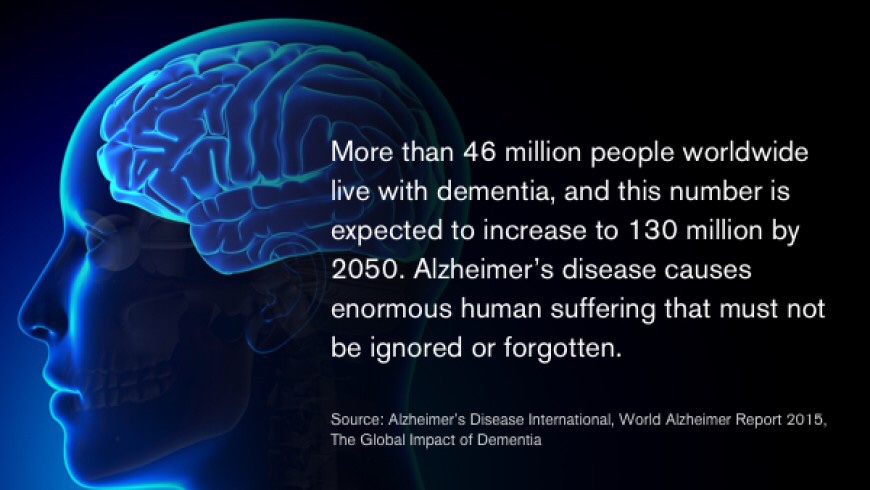At this point everyone is concerned about age-related changes, but especially if they had a relative with dementia or are concerned about dementia. It’s a frustrating field in some ways; Alzheimer’s is a devastating disease and there is no effective treatment for it. When people ask me what they can do, I tell them about exercising, mental stimulation, keeping socially active. And steps like eating a healthy Mediterranean diet, even if it won’t guarantee you have no cognitive problems as you age, at least won’t do you any harm. It is not like a taking a drug where there are possible side effects.
I truly believe you can take a holistic approach and with lifestyle changes (diet and exercise) you can be at a better stage.
Alzheimer’s Disease
Alzheimer’s is the most common cause of dementia, a general term for memory loss and other cognitive abilities serious enough to interfere with daily life.
Alzheimer’s worsens over time. Alzheimer’s is a progressive disease, where dementia symptoms gradually worsen over a number of years. In its early stages, memory loss is mild, but with late-stage Alzheimer’s, individuals lose the ability to carry on a conversation and respond to their environment. Alzheimer’s is the sixth leading cause of death in the United States. On average, a person with Alzheimer’s lives four to eight years after diagnosis, but can live as long as 20 years, depending on other factors.
Alzheimer’s has no current cure, but treatments for symptoms are available and research continues. Although current Alzheimer’s treatments cannot stop Alzheimer’s from progressing, they can temporarily slow the worsening of dementia symptoms and improve quality of life for those with Alzheimer’s and their caregivers. Today, there is a worldwide effort under way to find better ways to treat the disease, delay its onset, and prevent it from developing.
Just like the rest of our bodies, our brains change as we age. Most of us eventually notice some slowed thinking and occasional problems with remembering certain things. However, serious memory loss, confusion and other major changes in the way our minds work may be a sign that brain cells are failing.
The most common early symptom of Alzheimer’s is difficulty remembering newly learned information because Alzheimer’s changes typically begin in the part of the brain that affects learning. As Alzheimer’s advances through the brain it leads to increasingly severe symptoms, including disorientation, mood and behavior changes; deepening confusion about events, time and place; unfounded suspicions about family, friends and professional caregivers; more serious memory loss and behavior changes; and difficulty speaking, swallowing and walking.
The brain has 100 billion nerve cells (neurons). Each nerve cell connects with many others to form communication networks. Groups of nerve cells have special jobs. Some are involved in thinking, learning and remembering. Others help us see, hear and smell.
Scientists believe Alzheimer’s disease prevents parts of a cell’s factory from running well. They are not sure where the trouble starts. But just like a real factory, backups and breakdowns in one system cause problems in other areas. As damage spreads, cells lose their ability to do their jobs and, eventually die, causing irreversible changes in the brain.
The role of plaques and tangles
Two abnormal structures called plaques and tangles are prime suspects in damaging and killing nerve cells.
- Plaques are deposits of a protein fragment called beta-amyloid (BAY-tuh AM-uh-loyd) that build up in the spaces between nerve cells.
- Tangles are twisted fibers of another protein called tau (rhymes with “wow”) that build up inside cells.
Scientists do not know exactly what role plaques and tangles play in Alzheimer’s disease. Most experts believe they somehow play a critical role in blocking communication among nerve cells and disrupting processes that cells need to survive.
It’s the destruction and death of nerve cells that causes memory failure, personality changes, problems carrying out daily activities and other symptoms of Alzheimer’s disease.
Today, Alzheimer’s is at the forefront of biomedical research. Researchers are working to uncover as many aspects of Alzheimer’s disease and other dementias as possible. Some of the most remarkable progress has shed light on how Alzheimer’s affects the brain. The hope is this better understanding will lead to new treatments. Many potential approaches are currently under investigation worldwide.

